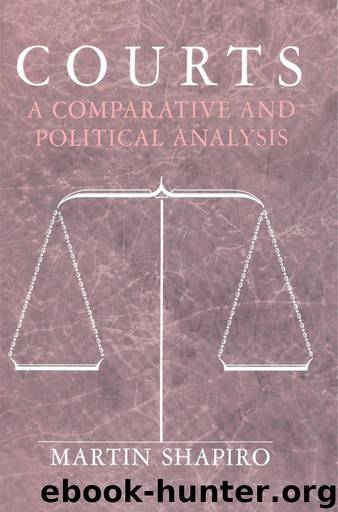Courts: A Comparative and Political Analysis by Martin Shapiro

Author:Martin Shapiro [Shapiro, Martin]
Language: eng
Format: epub
Publisher: University of Chicago Press
Published: 2013-11-15T00:00:00+00:00
3
THE CIVIL LAW SYSTEM AND PREEXISTING LEGAL RULES
The experience of English courts is usually offered to illustrate the element of judicial independence in the conventional prototype of courts. We have now seen that the English experience is ambiguous even on the question of judicial independence. It would be even more difficult to argue that English legal history supports the conventional element of judicial decision according to preexisting legal rule. For a legal system that openly proclaims that its law is made case by case by the judges themselves can hardly typify decision by preexisting rule. It has usually appeared that the Continental legal system, although not so clear-cut in terms of judicial independence, better satisfied the standard of preexisting rules. As opposed to the case law of England, the Continent enjoyed code law. The code is a complete system of legal rules. The task of the European judge is simply to select the appropriate rule from among those preexisting in the code and apply it to the case at bar.
Such a characterization of civil or Roman law systems, as the legal systems of such countries as France, Italy, and Germany are called,1 is fundamentally incorrect. Indeed, contemporary authorities clearly proclaim the misleading nature of the contrast between Anglo-American law as case law and civil law as code law.2 But what has not been so widely noticed is that, if even Continental judges do not consistently decide according to preexisting legal rules, then that element of the prototype of courts is not clearly applicable to either of the two major courts systems from which it was derived. For this reason I shall focus on the extent to which judges in civil law systems do decide according to preexisting rules given to them by their legal code.
A code law judge would be most completely bound by preexisting rules if his code were complete, consistent, specific, produced by a single authoritative legislator, and capable of rapid amendment by that legislator to meet changing circumstances accurately. No code can fully meet these conditions.
The Roman Experience
The modern civil law systems of Western Europe are derived from Roman legal experience, as are those of Latin America, the former French colonies of sub-Saharan Africa, Japan, and Eastern Europe. Thus it is customary to begin any analysis of civil law systems with a description of Roman law.3
For our purposes relatively little need be said about the law of republican or early imperial Rome. In chapter 1 we looked at the formulary procedure of early Rome as a device for maintaining legitimacy through consent. From another perspective that procedure can be seen as producing a highly particularized law that is the very opposite of the general rules of broad applicability usually ascribed to Roman law systems. In fact until the Imperial period Roman law was highly particularized. It will be recalled that when two Romans sought triadic resolution of a dispute, they went to a third person who formulated a legal rule that both could agree was applicable to their dispute and should guide the iudex.
Download
This site does not store any files on its server. We only index and link to content provided by other sites. Please contact the content providers to delete copyright contents if any and email us, we'll remove relevant links or contents immediately.
American Kingpin by Nick Bilton(3887)
Future Crimes by Marc Goodman(3600)
The Meaning of the Library by unknow(2572)
Inside the Middle East by Avi Melamed(2357)
Why Nations Fail: The Origins of Power, Prosperity, and Poverty by Daron Acemoglu & James Robinson(2297)
On Tyranny by Timothy Snyder(2232)
Living Silence in Burma by Christina Fink(2072)
Putin's Labyrinth(2022)
The Mastermind by Evan Ratliff(1938)
The Smartest Kids in the World by Amanda Ripley(1856)
Think Like a Rocket Scientist by Ozan Varol(1821)
Law: A Very Short Introduction by Raymond Wacks(1748)
It's Our Turn to Eat by Michela Wrong(1731)
The Rule of Law by Bingham Tom(1698)
Philosophy of law a very short introduction by Raymond Wacks(1671)
Leadership by Doris Kearns Goodwin(1641)
A Dirty War by Anna Politkovskaya(1633)
Information and Communications Security by Jianying Zhou & Xiapu Luo & Qingni Shen & Zhen Xu(1621)
Civil Procedure (Aspen Casebooks) by Stephen C. Yeazell(1556)
